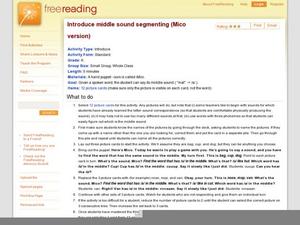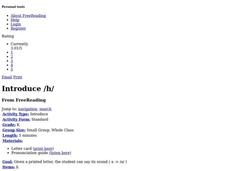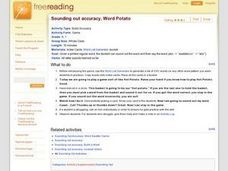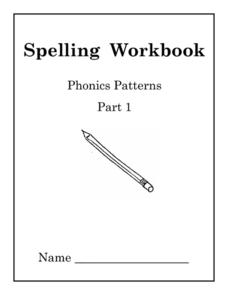Curated OER
Introduce Middle Sounds Segmenting (Mico Version)
Mico the puppet offers a phoneme challenge for emerging readers: can they find the object with the middle sound they hear? Use the fantastic set of full-color picture cards to play this game with small groups or even the whole class....
Curated OER
Long Vowel U Sounds
This worksheet is straight-forward and easy to follow. Have your young learners look at the words below and place them in the correct category. Does the word have the ew letter combination or a u and silent e combination? For you very...
Curated OER
Introduce /h/
Explore the letter h using these strategies combining pronunciation, recognition, letter sound, and word examples. Scholars examine the letter shape and listen to you pronounce the /h/ sound. As you explain how this sound is made, they...
Curated OER
Beginning and Ending Sounds
First graders practice their letter and word recognition skills. In this initial and final sounds lesson, 1st graders participate in a classroom activity that requires them to blend phonemes into spoken words and sound out multisyllable...
Curated OER
Sounding out accuracy, Word Potato
Learning to sound out CVC words can be fun, when you turn skills practice into a game. Kids play "Hot Potato" by passing a bucket filled with phonetically regular words on cards. When the music stops, students choose a word and sound it...
Curated OER
Beginning Sounds Worksheet
In this beginning sounds activity, students look at pictures, pronounce the word, sound out the beginning sound, and circle the letter that each picture begins with. Students circle four multiple choice answers.
Curated OER
Phonics: Decode and Write Words
Sounding out individual phonemes and blending them to make a word is usually one of the first tasks mastered when learning to read. Make master decoders out of your learners, they sound out a series of simple two and three-letter cvc...
Curated OER
Decode and Write Words with More Than One Syllable
Practice sounding out multi-syllable words with this scaffolded lesson. Learners decode words by segmenting them into phonemes and combining the sounds. Your lines are in bold here, but you can easily use this simply as an outline...
Kiz Club
"Q" Sound
Quick! Print this worksheet out so your pupils can master the letter Q. Given four sets of three images, learners circle the image in each set that begins with the letter Q.
Curated OER
Word Wheel
Make a phonics wheel with your young learners! Either provide the pieces pre-cut for your learners, or have them practice their fine-motor skills to cut out the four circles provided. When the wheel is assembled, learners can create...
Florida Center for Reading Research
Word Steps
Blending basic CVC letters to make words is one of the first steps to independent reading. Provided here are several images of stairs and several letters to cut and arrange. The learner rearranges the letters to form CVC patterns, sounds...
Perkins School for the Blind
Find the Objects/Beginning Sound Indentification
If you are just starting out as a teacher for children with visual impairments and want a fun way to teach braille and phonemic awareness, look no further. You'll fill 21 boxes with objects that start with specific letter sounds. You'll...
Kathryn J. Davis
Spelling Workbook: Phonics Patterns
Set your pupils straight with spelling and sounds by using these materials for practice. Included here are three booklets and workbooks that cover just about any sound or blend you could think of!
Curated OER
Sounding out accuracy, Word Baseball
Students practice sounding out words. In this phonics lesson, students play a baseball game, practicing sounding or stretching out words for accuracy. Students read the word off the card and stretch it out.
Curated OER
School-Home Links: Say Sounds of Letters in a Word
In this letter sounds learning exercise, students look at each word, point to each letter, and make that letter's sound. Students repeat each word on the page. Students then sound out the letters in their name.
Curated OER
Move the Sounds
Use cut out letters to make beginning sounds, blends, and word families that ultimately make new words. Learners move around physically as they hold the letters to make the specified blend or word. Assessment suggestions are included.
Curated OER
Reintroduce /a/
What does the letter a sound like? Scholars practice with letter sound correspondence by honing their pronunciation of the /aaa/ sound. Use these helpful tips to explain how to make this sound if needed. Then, they brainstorm words that...
Curated OER
Phonemic Awareness: Blending
First graders listen closely as their teacher sounds out a variety of words, one phoneme at a time. They then practice blending sounds to create words on their own. Tip: While you sound out words have your class write down each phoneme...
Curated OER
Phonics: Decode and Write Words with Blends
Kids see, say, then count the phonemes they hear in a series of simple words. They practice counting phonemes with the teacher, then sound out the same word on their own. As they count each phoneme they write it down on their paper. A...
Curated OER
Phonics: Read and Write Words with a Consonant Blend
Reading often times starts with phonemic awareness and letter sound correspondence. Get little ones blending those letter sounds together to read and write simple words. As the teacher sounds out each word, learners count phonemes, and...
Curated OER
Letter Pronunciation - "h" sound
For this letter pronunciation- "h" sound worksheet, students use pictures to identity "h" words and write the words in complete sentences. Students complete seven activities.
Novelinks
Tunes for Bears to Dance to: A Letter for Henry
Readers of Tunes for Bears to Dance to are asked to write a personal letter to Henry, the main character in Robert Cormier's young adult novel, offering Henry advice about whether he should do as Mr. Hairston wants.
West Virginia Department of Education
Harpers Ferry Letters
Scholars write letters as if they were someone who heard the story of John Brown's raid. The resource, a standalone, covers information from primary sources that is important to West Virginian history: the Harpers Ferry Letters.
Curated OER
Mouse Mess
Scholars practice rhyming and phonemic awareness using trade books and poetry. They will listen to the book Mouse Mess several times throughout the week, identifying rhyming words, and matching words that begin with the same sound. Then...

























